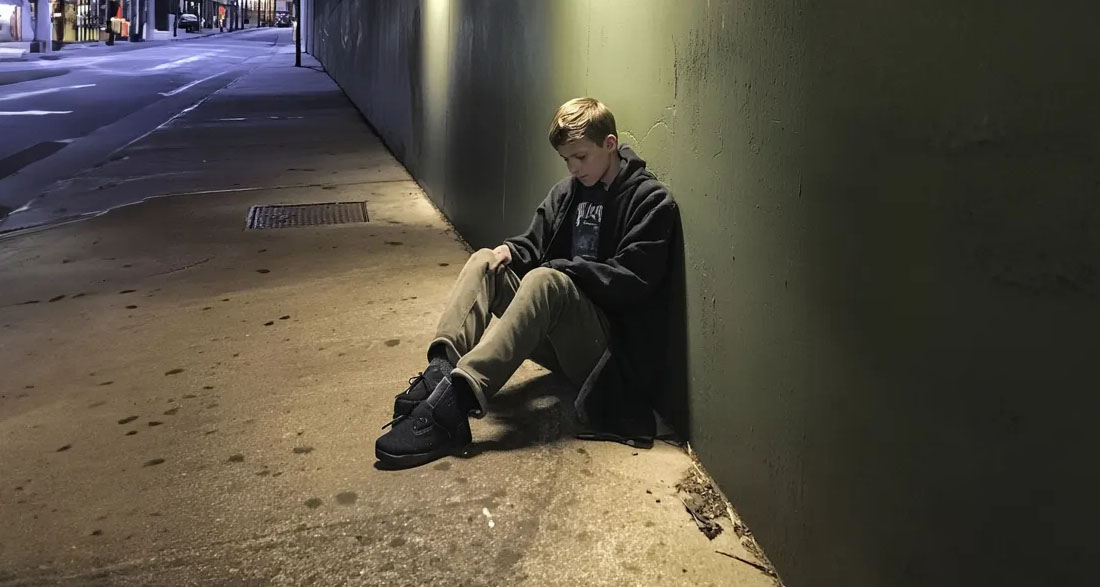The underground passage was alive with the sounds of hurried footsteps, but Martin sat quietly against the wall, his small shoe-shining kit spread out before him. The 14-year-old boy’s eyes darted nervously to the people rushing by. He could only hope for one person to stop, to offer him a chance to earn a little money.
“Please, just a handful today,” he whispered, his voice barely audible. “Just a handful.”
He hadn’t eaten much that morning—just two slices of bread—and now his stomach growled loudly in protest. Martin reached for his water bottle and took a tiny sip, trying to ignore the hunger gnawing at him.
“You can do this, Martin,” he whispered to himself, reminding himself of why he kept going. “For Mom and Josephine.”
His mind quickly flashed to his paralyzed mother and his little sister, Josephine, both waiting for him at home. That thought alone gave him strength, and he forced a smile onto his tired face. He could handle whatever the day threw at him.
“Shoe shine, sir? Ma’am?” he called out, his voice struggling to rise above the noise of the busy underground.
Hours passed. The sun outside burned hot, and Martin’s hope began to fade. No one had stopped. His spirits were sinking, but he refused to give up. He kept his eyes on the shoes of each passerby, wishing for a customer.
When he could no longer stand the emptiness, he finally allowed himself a moment of rest. Digging into his old leather bag, he pulled out a small, wrinkled orange. It was his lunch.
As he peeled it, he heard a thud—a heavy sound of boots landing in front of him.
“Hurry up, kid. Clean it. I’m in a rush,” a deep voice barked.
Martin looked up quickly, startled. The man towering over him looked rich—expensive clothes, shining watch, shoes that practically screamed money. This was his chance. This could be the moment he needed.
“Right away, sir!” Martin said eagerly, setting his orange aside as he grabbed his shining cloth and polish.
The man’s impatience was clear. “What’s taking so long? I don’t have all day!” he growled.
Martin’s hands shook as he worked, but he focused, determined to do the best job he could. “Almost done, sir. I promise it’ll look great.”
The man let out a sharp scoff. “At your age, I was already making more than my father. I wasn’t shining shoes like some beggar.”
The words cut through Martin like a knife. His father had died just three years ago, taken away by a drunk driver in a crash that still haunted Martin’s every thought. He could still remember the sound—the tires screeching, the crash, the phone call that shattered his world.
Then, only months after his father’s death, his mother had suffered a stroke that left her paralyzed. It was up to Martin now to take care of his family. At just 11 years old, he had learned to shine shoes in his father’s place.
The man sneered down at him, interrupting his thoughts. “You call this shining? My dog could do a better job with his tongue!”
Martin’s cheeks burned with shame. He swallowed hard, but he didn’t lose his composure. “I’m sorry, sir. I can try again—”
“Forget it.” The man waved his hand dismissively, pulling out his phone. “Yeah, Sylvester here. Reschedule the meeting to 4. I’ll be late, thanks to this incompetent brat.”
As the man ranted on, Martin’s mind drifted to happier memories—his father teaching him how to shine shoes with pride.
“It’s not just about the shine, son,” his father had told him. “It’s about dignity. Treat every shoe like it’s the most important one you’ll ever touch.”
The man, Sylvester, snapped him back to the present. “Hey! Are you even listening? What’s your father doing, sending you out here like this? Too lazy to work himself, huh?”
Martin’s throat tightened with the painful memory of his father. “My father… he passed away, sir.”
Sylvester looked him over with cold eyes. “Oh, I see. So your mother probably moved on with someone else, popping out more kids to send begging, right? Don’t you people have anything better to do?”
Fury bubbled up inside Martin, but he forced himself to keep calm, managing a polite smile. “That’ll be $7, sir.”
“SEVEN DOLLARS?” Sylvester exploded. “For this pathetic excuse of a shine? I don’t think so, kid.”
Before Martin could respond, Sylvester grabbed his shoes and stormed off, leaving Martin standing there, empty-handed and heartbroken.
“Wait!” Martin called, rushing after him. “Please, sir! I need that money. Please!”
But Sylvester had already hopped into his expensive car and sped off, leaving Martin standing in the street, his hopes dashed.
Slumping back against the wall, Martin’s eyes welled with tears. His heart ached with the weight of everything—his family’s struggles, his father’s death. He looked up at the sky, wishing for a sign.
“I’m trying, Dad,” he whispered softly. “I’m really trying.”
His father’s voice echoed in his mind: “Remember, son. Never give up. Each bump is a step closer to your dreams. Remember.”
Wiping away his tears, Martin knew there was no time for sorrow. He had a family to take care of. There was work to do.
The next morning, Martin returned to his usual spot, setting up his kit with a renewed sense of determination. As he was adjusting his polish, a frantic voice suddenly pierced the air.
“Help! Someone help!”
His heart raced as he rushed toward the commotion. A small crowd had gathered around a fancy car, and Martin froze when he saw who it was.
Sylvester. The same man who had insulted him the day before.
“He’s choking on an apple!” someone shouted. “The car doors are locked!”
Without thinking, Martin grabbed a rock and smashed the car window. Glass shattered everywhere as he reached inside to unlock the door.
“Stand back!” he shouted. With all his strength, he pulled Sylvester out of the car and onto the pavement.
Martin slapped Sylvester’s back, and after a few hard blows, a piece of apple shot out of his mouth. Sylvester gasped for air, his eyes wide in shock.
“You… you saved me,” Sylvester gasped.
Martin nodded, shaking with adrenaline. “Are you okay, sir?”
Sylvester took a shaky breath, still recovering. “I can’t believe it. After how I treated you yesterday… Why did you help me?”
Martin simply shrugged. “It was the right thing to do.”
Sylvester’s eyes welled up. “I’m so sorry, kid. I was awful to you. Please, let me make it up to you. Name your price. Anything!”
Martin thought for a moment. Then he spoke quietly. “Just the $7 from yesterday. That’s all I want.”
Sylvester stared at him in disbelief. “But… I could give you so much more. A new start, maybe?”
Martin shook his head. “I don’t need a new start, sir. I just need to take care of my family.”
Reluctantly, Sylvester pulled out the $7 and handed it over. The crowd dispersed, but Sylvester remained, studying Martin with a look of quiet admiration.
“You’re quite something, kid,” he said, his voice softening. “What’s your name?”
“Martin, sir.”
Sylvester nodded slowly. “Martin. I won’t forget this… or you.”
As Sylvester walked back to his car, Martin clutched the money in his hand. He looked up at the sky once more, his heart filled with pride.
“I remember, Dad,” he whispered softly. “I always do.”
The next morning, Martin was jolted awake by Josephine’s excited screams.
“Marty! Marty! Come quick!”
Confused, Martin rushed outside, calling to their mother, who was sitting in her wheelchair. There, on their doorstep, was a white bag stuffed with cash, along with a note.
With trembling hands, Martin read aloud:
“Thanks is a small word for what you did. I know you’d refuse this, but you deserve a happy childhood. Took me just an hour to find your address. The world’s a small place, isn’t it? Hope we meet again someday, and I hope you’re just the pure heart of gold you are!
— Sylvester”
Tears filled Martin’s eyes as Josephine jumped up and down with joy. Their mother, astonished, wheeled herself closer.
“Martin? What’s going on?” she asked.
The money could change everything. It could help with his mother’s treatment, Josephine’s education, and their future. But was it right to accept it?
Martin stood before a small altar in their cottage, grabbing two pieces of paper. One read “REMEMBER,” and the other “FORGET.” He folded them and held them in his hands, staring at the lit candle in front of the crucifix.
“Dad,” he whispered, “help me make the right choice.”
With a deep breath, he picked up one of the folded pieces of paper. He slowly opened it, and a small smile appeared on his face when he saw the word “REMEMBER.”
In that moment, Martin knew. He would accept the money—but not for himself. For his family.
“Josephine!” he called out. “Go tell Mom we’re going to the doctor today. And then… maybe we’ll stop for ice cream on the way home. Get Mom a new comfy mattress. And lots of groceries for the entire week!”
Josephine squealed in delight as she ran off. Martin looked down at the note, clutching it close to his chest. He had remembered, and in doing so, he had found the way forward.














